Five University of Georgia faculty and staff members are being honored for their commitment to public service and outreach.
Walter Barnard Hill Fellow
The Walter Barnard Hill Fellow Award for Distinguished Achievement in Public Service and Outreach is named for Chancellor Walter B. Hill, who led the University of Georgia from 1899 to 1905. Hill was a pioneer who helped define the university’s modern public service and outreach mission. The Hill Fellow recognizes faculty for long-term achievements and special projects that have extraordinary impact, and collaborative efforts that improve quality of life in Georgia. Only past UGA Hill Award winners are eligible to become a Hill Fellow. Each Hill Fellow receives a medallion, a permanent salary increase and $2,000 in discretionary funds per fiscal year for three consecutive years to advance his or her public service work.
Phillip Brannen is a professor and Extension specialist in the plant pathology department in the College of Agricultural and Environmental Sciences. He collaborates with UGA Cooperative Extension agents and fruit producers across Georgia to reduce the impacts of disease and climate on the state’s vital crops.
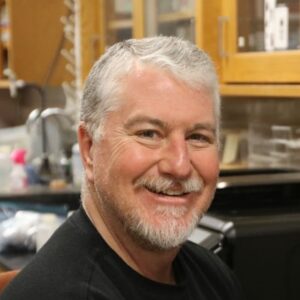
Georgia’s fruit markets generate $622 million in direct sales, with many linked to agritourism, enhancing their economic value. Vineyards and wineries alone contribute $5.3 billion to the state economy, supporting around 40,000 jobs.
As UGA Cooperative Extension’s fruit pathologist, Brannen specializes in integrated pest management and technology transfer to help commercial fruit producers boost efficiency, productivity and profitability. His research has secured $2.4 million in grants and donations, including fungicides, along with support from the CAES Research and Education Center.
Over nearly 25 years at UGA, Brannen has tackled some of the most pressing challenges to crop sustainability. He has provided solutions for threats like powdery and downy mildews in wine grapes, Exobasidium leaf and fruit spot in blueberries and phony peach disease, a bacterial infection causing premature tree decline. These successes are a result of his research and close collaboration with growers.
In addition to his research and Extension work, Brannen teaches, fulfilling the land-grant institution’s mission of teaching, research and outreach. His graduate students participate in his research and Extension activities, contributing to presentations and publications. He teaches courses like Viticulture and Enology in Cortona, Italy; the Integrated Pest Management course; and the Field Pathology course. In 2022, Brannen was inducted into the Integrated Pest Management Hall of Fame, receiving a lifetime achievement award, and he was honored with the Hill Award in 2016.
Walter Barnard Hill Award
The Walter Barnard Hill Award also is named for Chancellor Walter B. Hill. The Hill Awards recognize distinguished achievements by public service faculty who have contributed to a better quality of life for the people of Georgia. Each award recipient receives a medallion, a permanent salary increase and a framed certificate in honor of his or her achievement.
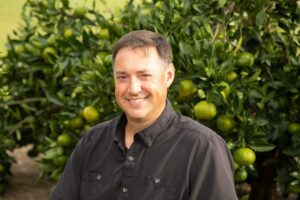
Jacob Price is a senior public service associate and Lowndes County Extension coordinator with the College of Agricultural and Environmental Sciences. In this role, Price has played a pivotal role in introducing cold hardy citrus to Georgia, generating $40.7 million in new income for south Georgia communities.
In 2013, Price initiated cold hardy citrus production with a meeting in Valdosta, introducing it as an alternative crop. Demand quickly outpaced supply, and by 2024, citrus production in the state expanded to 4,385 acres, with mandarins, oranges and grapefruits now being sold in major grocery chains like Winn-Dixie, Publix and Whole Foods. Prior to 2013, only seven scattered acres of citrus were cultivated in Georgia.
Price’s efforts led to the establishment of four USDA-certified citrus nurseries and three citrus packing houses, demonstrating the sustainability of the industry in Georgia. He also played a key role in founding the Georgia Citrus Growers Association and the Citrus Commodity Commission. In 2023, the state General Assembly allocated funds to hire a citrus specialist and a citrus breeder, further advancing the industry.
In addition to his work with citrus, Price collaborates with the UGA Small Business Development Center to assist new citrus growers with business planning. As the Lowndes County Extension coordinator, he also raises funds for local 4-H programs and donates citrus to community organizations like Second Harvest of South Georgia and the Valdosta School Nutrition Program.
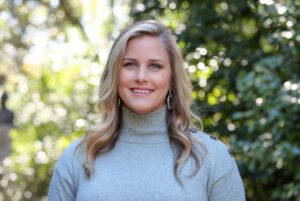
Kaitlin Messich is a public service associate at the Carl Vinson Institute of Government, where she uses her background in fine arts and design to enhance both print and digital materials promoting the institute’s programs and fostering economic development.
Messich began her career with Public Service and Outreach as a graduate assistant at the J.W. Fanning Institute for Leadership Development. There, she created renderings for downtown strategic plans developed by Fanning faculty for communities statewide. While pursuing her Master of Historic Preservation and Master of Fine Arts, Messich continued to support downtown planning efforts at the Institute of Government, which runs the Georgia Downtown Renaissance Partnership in collaboration with the Georgia Municipal Association and the Georgia Cities Foundation. She was so integral to the partnership that she was hired to establish the first community planning and design studio at the institute.
In 2018, Messich launched the institute’s first branding program, guiding communities to create brand identities and strategies for attracting investment. Her work in Hawkinsville led to a revitalization plan that secured $500,000 from the Georgia Department of Natural Resources and $4.5 million for downtown streetscape improvements. Since 2019, Messich has assisted 16 communities with their branding strategies.
In 2024, Messich was appointed the first art director for the Institute of Government, recognizing her leadership and mentorship of the design team and students.
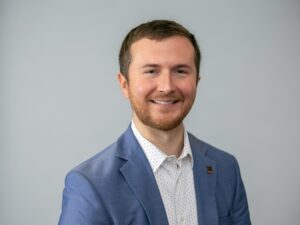
Sam Perren serves as the operations coordinator for the Archway Partnership, a division of Public Service and Outreach. Since joining UGA in 2017, Perren has led initiatives that have significantly impacted Georgia and expanded the university’s service mission.
Initially hired to oversee unit-wide projects, Perren quickly established himself as an expert in rural community development. He served as an Archway Professional Generalist for Pulaski County, then as an Archway Professional in Thomson-McDuffie County, and now holds a senior leadership role in the Athens office.
One of his early accomplishments was collaborating with the Carl Vinson Institute of Government to create a method for evaluating the economic impact of Archway’s community programs. This work enabled Archway to demonstrate a return on investment exceeding $30 million for Georgia’s communities over the past eight years.
In 2022, with help from the UGA Federal Relations Team, Archway submitted a $300,000 funding request to Congress for workforce development initiatives in Archway communities. Perren, who had been promoted to Archway Operations Coordinator, created a historic report of the partnership’s workforce efforts across the state, and a description of each location and project. This led to a $3 million grant from the Department of Labor — the maximum allowed — that will fund workforce planning and support rural development projects in Archway communities.
Engaged Scholar
The Engaged Scholar Award recognizes a tenured associate or full professor who has made significant career-spanning contributions to the University of Georgia’s public service mission through scholarship, service-learning opportunities for students and campus leadership. The awardee receives a $5,000 faculty development grant to sustain current engaged scholar endeavors or to develop new ones.
Jenay Beer is an associate professor at the University of Georgia Institute of Gerontology, with joint appointments in the College of Public Health and the School of Social Work.
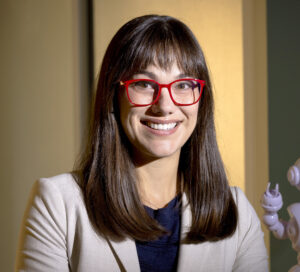
As co-director of the Cognitive Aging Research and Education (CARE) Center, Beer leads a team that works across rural Georgia to support individuals with dementia and their caregivers, helping them navigate the challenges of living with this incurable condition.
Beer joined UGA in 2017 with expertise in designing technology, equipment and environments for older adults, particularly those with dementia. She quickly recognized the public health challenges faced by Georgia, a predominantly rural state with low health and technology literacy.
To address these issues, Beer collaborated with a fellow faculty member to form an interdisciplinary team that launched the CARE Center, which redefined how dementia is perceived.
Located on UGA’s Health Sciences Campus in Athens, the CARE Center serves as a hub for dementia education, research and support. Beer and her team work with health care providers and researchers to offer dementia risk reduction education, conduct cutting-edge research and provide support for dementia patients and their families.
CARE Center teams, comprised of UGA faculty and staff from public health, social work, the Archway Partnership and Cooperative Extension, began holding listening sessions, clinics and support groups in rural counties. In addition to overseeing the program, Beer has remained committed to projects at the local level, serving as the center’s lead liaison to McDuffie and Washington counties, two Archway Partnership communities.
By educating communities, training health care providers and first responders, and developing curricula, Beer and her team bridge the gap between UGA’s public health missions and the pressing public issue of dementia. Her efforts to implement telehealth services and digital health materials demonstrate a commitment to maximizing state resources and producing tangible, long-term impacts, in line with the university’s culture and stewardship of public investment.


